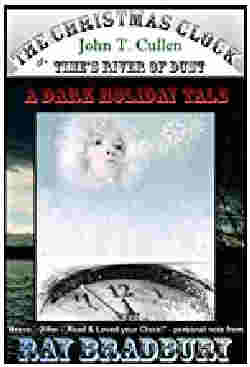The First Hour
11.
 Pushing the door open, Arthur entered the all-night clerk’s office. A middle-aged woman sat at a desk, reading a newspaper in the greenish glow of a library lamp. “Can I help you?” Pushing the door open, Arthur entered the all-night clerk’s office. A middle-aged woman sat at a desk, reading a newspaper in the greenish glow of a library lamp. “Can I help you?”
“I came to pick something up.” Arthur stamped snow from his shoes and walked up to the counter. He laid his business card down on the worn brown countertop. He put the key down next to it, but the key vanished as if he’d never had it.
“The units are locked for the night,” she said, rising and walking toward him with her arms folded together over her bosom, under a thick woolen shawl. “What a night to be out. Are you having some kind of emergency?”
Arthur didn’t know quite what to say, and somehow he knew he didn’t need to say much. He pushed the card forward a few inches with his fingertips.
She started to say: “Can’t help you at this hour, Mister.” She saw the card and fell silent . She looked at him, at the card, and at him again with a light of realization dawning on her features. “You are—?”
“Arthur Latchloose.”
She nodded. “Ah yes.” She extended a soft, heavy hand. “I’m Rose Attar. You can call me Rose.” She was a fiftyish woman, slightly fuller and squarer than one might expect, and there was gray around the roots of her dyed-blond hair, but her features were pleasant, handsome, and symmetrical, with an angular jaw and full mouth, and sympathetic blue eyes. “Okay,” she said dreamily, “I get it. You came for the clock.”
“You knew about it then?”
She seemed momentarily confused. “Yes. I don’t know how or why, but I knew you were coming. I’ll get the night man to bring it around.” She picked up a desk phone, dialed, and waited.
Arthur heard a distant ringing on the other end of the line. She cupped her hand over the mouthpiece and whispered: “I’m surprised you’d be here—or anyone working with you—at this hour, in the storm.”
“I want my clock very badly, and I can pay extra for quick service getting it home,” Arthur said.
“We’ll see what we can do,” she said. Arthur heard a man’s voice on the other end, from across the counter. She turned away and muttered instructions. Hanging up, she told Arthur: “The night man will be right over.”
“That will be great.” Arthur felt the watch in his hand, in his pocket. The watch felt warm and alive, almost like a beating heart that wanted to be reunited with its body. For a moment, he thought it wriggled like a fish. Or maybe his hand had simply twitched for no reason.
The door opened, and a man stomped in, brushing snow off his clothes. He was a thin, tall, graying man who looked as if he had been an athlete long ago. His mouth and chin had a crisp look, with small evenly set teeth, to match a hawkish nose and cutting eyes. “This the gentleman?”
“Yes, this is Mr. Latchloose.” To Arthur, she introduced the newcomer as Roger Cup handle.
Cup handle extended a hard, vise-like hand. “I’m the night man here, and I do everything. Rose tells me you have a clock you want to pick up from storage with us.”
“If you don’t mind.” There was something odd about Cup handle, and Arthur couldn’t quite put his finger on it. Maybe his eyes looked just a trifle shifty. Arthur was a pretty decent judge of people, and he had a nagging doubt about his fellow.
“Come on.” He turned and led Arthur out into the wintry landscape, while Rose stayed leaning against the counter inside with her arms again folded under the shawl.
It was a short ride among the white-dusted lanes among the storage units. “You get ready for Christmas?” Cup handle said by way of making conversation.
“I’m afraid it’s been some years since I bothered.”
“Now that doesn’t seem so reasonable.”
Arthur examined the inventory of his losses. “I just don’t have any reason to.”
“Reason is only the half of it. The other half is fun, faith, frivolity. Think about how crazy you have to be to fall in love and get married. I’m sure you were at that point once.”
“Long ago. My wife has died, and my children have moved away.” He wished Cup handle would be quiet and mind his own business.
“Children move away far?” Cup handle seemed entirely at ease in the warmth of the cab, and Arthur was grateful the truck was so new and clean.
“Far enough. We’ve lost contact.”
“Now how was that? I’ve got family all over the country, and we manage to at least call each other, if not visit. If you don’t mind me asking. Sounds like there’s some bad blood there, Mister.”
“I wouldn’t go that far. My wife and I, we had a wonderful life together, until she got sick and faded away. Cancer, you know.”
“I’m sorry to hear.”
“Thanks. Yes, it’s never been the same since. And then my son and daughter, well, they went their separate ways and we all seem to have lost interest in each other. Well, to tell the truth, I was disappointed that…” Arthur stopped talking because the other man wouldn’t understand, and on the surface maybe it sounded selfish, but he had wanted Edward to take over the business from him, and Anne not to marry a failure like this Tim Wood pond she’d dredged up at some church social, instead of a successful lawyer or banker. Not only had Gretchen betrayed him, by going off and dying like that, but his children had turned against him. He finished lamely: “It’s a chicken and egg thing, you know? Who knew who struck the first blow or said the first hurtful words. It just went spinning out of control.”
Cup handle leaned a little bit into a corner as the truck slipped on ice and then corrected. “Yes, that’s how it goes. Nobody wants to say they’re sorry, or admit they might have been wrong. Even a little bit. Nobody wants to open the door a crack.”
“Aren’t those the same thing, saying sorry and admitting you’ve been wrong?” Arthur knew he had not been wrong. Neither had anyone else. The good life and its prospects had just slipped away.
Cup handle grinned. “Why quibble? You can say you’re sorry without admitting you might have been wrong. You have to learn to be more irrational. Go with the flow, as they say. Maybe a person is sorry because they feel bad. That’s not the same as saying they were wrong. Suddenly everyone feels good again, and we don’t have to know why. That’s how it’s done—you just do it.”



|

 Thank you for reading. If you love it, tell your friends. Please post a favorable review at Amazon, Good Reads, and other online resources. If you want to thank the author, you may also buy a copy for the low price of a cup of coffee. It's called Read-a-Latte: similar (or lower) price as a latte at your favorite coffeeshop, but the book lasts forever while the beverage is quickly gone. Thank you (JTC). Thank you for reading. If you love it, tell your friends. Please post a favorable review at Amazon, Good Reads, and other online resources. If you want to thank the author, you may also buy a copy for the low price of a cup of coffee. It's called Read-a-Latte: similar (or lower) price as a latte at your favorite coffeeshop, but the book lasts forever while the beverage is quickly gone. Thank you (JTC).
|
TOP
|
MAIN
Copyright © 2014 by Jean-Thomas Cullen, Clocktower Books. All Rights Reserved.
|